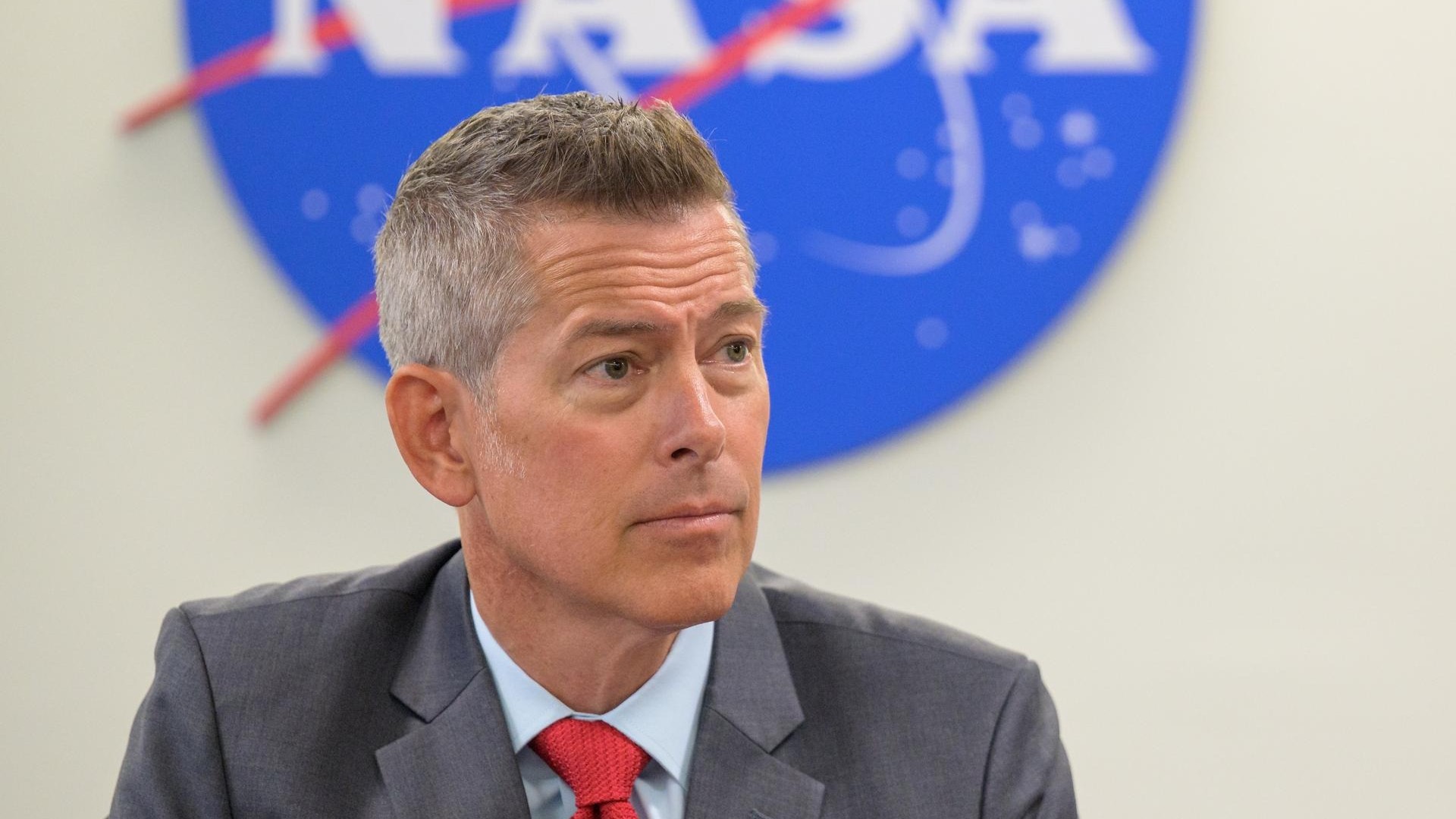NASA's acting administrator is pushing back against recent claims that the agency is losing ground to China in the race back to the moon.
Sean Duffy addressed employees in an internal NASA town hall last week, just one day after Senate testimony suggested that China may land astronauts at the lunar south pole before the U.S. does so. "I'll be damned if that is the story that we write," Duffy said. "We are going to beat the Chinese to the moon. We are going to do it safely. We're going to do it fast. We're going to do it right."
Duffy's remarks were a direct response to testimony delivered at a Sept. 3 Senate Commerce Committee hearing titled "There's a Bad Moon on the Rise." During the hearing, several witnesses, including former NASA Administrator Jim Bridenstine and Mike Gold, the former acting associate administrator for NASA's Office of International and Interagency Relations, warned that China's lunar exploits could soon surpass America's.
NASA's Artemis program aims to return astronauts to the moon as a proving ground for future missions to Mars. Artemis 2 is the program's first crewed test flight of the Orion spacecraft, and will carry the first humans to visit the moon since the final Apollo mission in 1972.
Artemis relies on the massive Space Launch System (SLS) rocket. Artemis 2's SLS will soon complete its assembly inside the Kennedy Space Center's Vehicle Assembly Building, and is scheduled to launch no earlier than February 2026. The mission is designed as a lunar flyby, ferrying NASA astronauts Reid Wiseman, Christina Koch and Victor Glover, as well as Canadian Space Agency (CSA) astronaut Jeremy Hansen, on a free-return trajectory around the moon and back to Earth.
If NASA sticks to its current schedule, Artemis 3 will be the first mission of the program to land astronauts on the lunar surface — specifically, near the moon's south pole. NASA has slated Artemis 3 to launch sometime in 2027, but it's unclear if the agency will meet that target.
China is working on a similar timeline and is making real progress, a point that several witnesses made during the Sept. 3 Senate hearing.
"It is highly unlikely that we will land on the moon before China," Bridenstine told lawmakers. Both he and Gold expressed concern that delays in Artemis and budget uncertainty could allow China to reach the moon first and define international norms there.
"If they get there first, we will see a global realignment that will impact our economy, our tax base, our ability to innovate, and our national security in terms of diplomacy and geopolitics that will affect security and many other aspects of our daily lives," Gold said.
But Duffy struck a more confident and optimistic tone.
"NASA won't beat China to the moon," he said during the Sept. 4 town hall, quoting the previous day's testimony. "That was shade thrown on all of NASA."
Duffy told employees that the Trump administration is fully behind Artemis, despite NASA's broader budget challenges. "If I bring up NASA … the President's eyes light up," Duffy said.
Trump's fiscal year 2026 (FY 26) budget request cut NASA's budget by a historic 24%, with 47% of funding to agency science programs eliminated. Congress restored those cuts to match NASA's FY 25 allocations, but those revisions have not been finalized, and it's not clear if they will be.
One program that is expected to receive full funding, however, is Artemis.
Duffy tied the Artemis program to broader national ambitions, echoing previous statements from President Trump, who said the U.S. is committed to pursuing "a manifest destiny to the stars." The phrase "manifest destiny," historically linked to 19th-century U.S. expansionism and White colonialism, has drawn criticism in the past for evoking themes of conquest rather than peaceful exploration.

Duffy was joined on the town hall by recently appointed NASA Associate Administrator Amit Kshatriya, who used the event to lay out a sharp sense of urgency and direction.
Kshatriya said NASA must stay focused on public service, which is central to the agency and all of its activities. "We don't work for profit. We work for the people," he said. "The people have given us their treasure, and we need to make sure that we understand that obligation and what that actually means."
He said that agency leaders, himself included, are accountable for protecting the agency's missions and must be prepared to step aside if they can't deliver.
"You give me an obligation to protect the country and protect our missions and protect our assets… and we're not able to do it, then my job is to humbly say, 'I'm sorry, sir,' and give you a plan to bring somebody else," he said to Duffy.
Kshatriya told employees that NASA needs to shift its internal culture from analysis to action. "We want you to have the black pen, not the red pen," he said. "That's what this agency does. We build things. We make things."
Duffy echoed the need for speed and decisiveness, emphasizing that risk must be managed, not feared. "Sometimes we can let safety be the enemy of making progress," he said. "We have to be able to take some leaps."

Amid concerns from NASA's workforce over project cuts and layoffs already underway — NASA is losing nearly 4,000 employees to Trump's "deferred resignation program" — Duffy said that, while the agency's overall budget has decreased, the president has increased funding specifically for space exploration. "I think we have enough money to accomplish our mission," he said, referring to Artemis. "If we don't, I'll ask for more."
He also stressed that costs must come down. "At $4 billion a launch, it becomes very challenging to have a moon program," Duffy said, citing the current price per SLS mission.
Kshatriya said that everything NASA does must directly support Artemis, Mars, or science that enables human exploration. "If what you're doing doesn't help us get to the moon or beyond," he said, "stop doing it."
He expanded on that a bit, saying that other projects contribute to NASA as a whole, and therefore still serve to lift up Artemis. "Even though you might not be directly connected to the mission because of the work you enable, you help the agency be more efficient. You help the agency be more successful. You are connected to the mission as well," Kshatriya said.
Duffy said that NASA needs everyone still on board to bring their full effort. "We need all of you. We need this team, this intelligence, this drive," and he acknowledged that the agency has fallen behind in some respects. "We have burned time, and that means now we are under pressure," he said.
"We are not going to let this storied history of NASA be written that we lost the second space race," Duffy told employees.
.png)
 German (DE)
German (DE)  English (US)
English (US)  Spanish (ES)
Spanish (ES)  French (FR)
French (FR)  Hindi (IN)
Hindi (IN)  Italian (IT)
Italian (IT)  Russian (RU)
Russian (RU) 






Comments